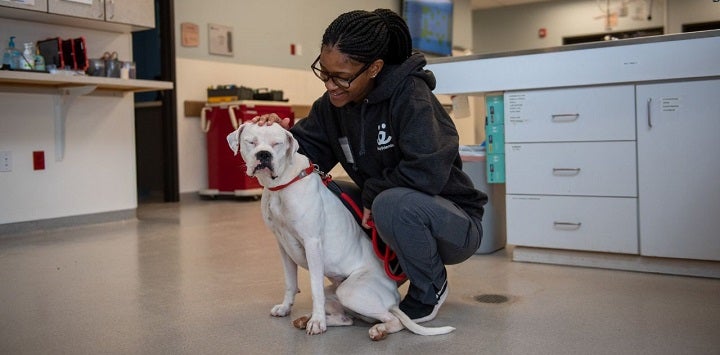
How to Host a Vaccine Clinic
The most important aspect of hosting a vaccine clinic is the preparation. From determining where to host the clinic, to how you will fund it and the supplies needed, organization and preparation will be the secret to your success. There are several questions to think through as you consider hosting a vaccine clinic.
Who is already hosting clinics and where?
- There is no need to duplicate services. If you’re in a community with multiple animal welfare organizations, survey the community to determine who is already hosting clinics, where and when.
- Consider if there is a particular area that would benefit most from a vaccine clinic. If possible, utilize shelter data to see where you can be most effective, which might be in those neighborhoods with the highest stray intake and/or those areas that are seeing a rise in preventable disease, such as parvovirus.
Where will you hold your clinic?
- You will need a physical location to host your clinic, which could be a mobile adoption or spay/neuter unit, your own shelter building or another site. Most importantly, consider where your vet will work, how pets will be contained (even in their own vehicle with a drive-thru clinic will work) and if you have enough space for support staff.
- Do you have an inclement weather plan if part of your staging or vaccine area is outdoors?
What times?
- Vaccine clinics should be accessible to pet owners, so consider what hours would work best for working families. This will mean hosting your vaccine clinic outside of normal business hours, either on a weekend or evening.
Where and how will you purchase vaccines?
- If you are already purchasing vaccines for you own shelter animals, you already have an outlet for the vaccines you’ll need. To help keep costs low for pet owners, talk with your pharmaceutical representative about potential sponsorship opportunities.
Do you have a vet on staff or do you need to find a volunteer veterinarian?
- Prior to announcing your clinic start date, make sure you have a commitment from either staff or volunteer veterinarian(s).
Forms and record-keeping?
- Consider all forms you will require for the day of your event and what records you will need to keep (e.g., rabies certificates, owner/pet information records, general vaccine records). Will you give paper copies of these records to the clients at the time of service? Are you recording these services in your database so that they can be provided at a later date? Will you do data entry in real time or do you need to prepare for post-event data entry? Who will be completing the paperwork and do you need volunteers for this job?
Event flow?
- What will be your flow to keep pets apart? You will want to have an easy flow whether your event is drive-thru, outdoors or inside your facility.
- Do you have enough space to keep pets far enough part to not have issues?
What vaccines and services will you provide? (combos, rabies, bordetella vaccines; microchip; heartworm tests)
- Vaccine needs may vary by region of the country. Consult with your veterinarian prior to the event to determine what combination of vaccines is most appropriate for your resources and region.
Cost per vaccine or package?
- You will want to determine what pricing structure you will use for your clinic and whether it will be a price per vaccine or a package cost.
Any requirements for participation?
- Will your vaccine clinic to be open to any participants or will you be restricting access? Dependent upon your resources, this could involve limiting participation to one zip code or neighborhood, requiring proof of need or having a maximum number of clients you can serve in one day.
Safety and emergency precautions
- Vaccine reactions can occur, so be sure to have supplies on hand in the event of an emergency. Also, consider what first-aid supplies and safety equipment you will need to have available to manage a fractious pet.
Staffing? How many people and volunteers do you need for a smooth event?
- Veterinary assistants, crowd control, registration assistance and record-keepers will all be necessary for the day of the event. A local college with a veterinary school or veterinary technician program can be an excellent source of volunteers if available.
Promotion and marketing
- Consider the population and community you are targeting to determine your most effective means of promoting this event.
- Effective marketing might include: social media campaigns, targeted social media advertising, flyers in the selected community and partnering with other human service agencies to spread the word.
- A local business may be interested in sponsoring this event and that could assist you with offering more services or existing services at a lower rate. Free microchips is a useful add-on for these events and will help you increase your return-to-owner rate.
Supply list for the day of the event
- Keep a list of all possible supplies you could need to make this event an success.
- Clipboards, pens, payment devices, coolers (for vaccines), muzzles, leashes, additional crates, tables/chairs, water for volunteers (don’t forget lunch if it’s an all day event), extra copies of all forms, shade structures for hot weather, water bowls
![]() DOWNLOADABLE PDFs, PLAYBOOKS, & SOPs
DOWNLOADABLE PDFs, PLAYBOOKS, & SOPs
Gateway Pet Guardians, Drive-Thru Vaccine Clinic SOP
Gateway Pet Guardians, Standard Vaccine Clinic SOP
![]() ADDITIONAL INFORMATION
ADDITIONAL INFORMATION
Gateway Pet Guardians, Vaccine Clinic Volunteer Training Module